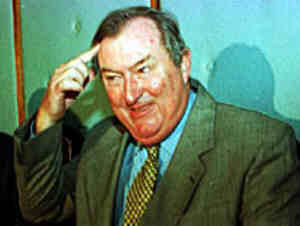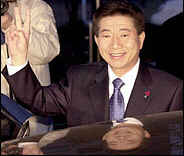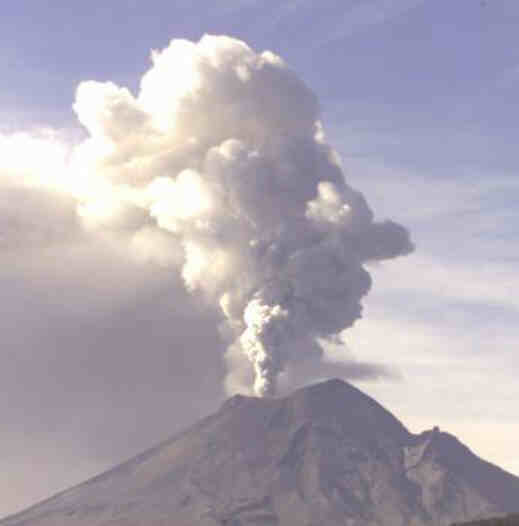Births which
occurred on a December 19:
1974 Altair 8800 computer
goes on sale
The personal computer
revolution begins quietly with the Altair 8800, a do-it-yourself computer
kit, going on sale for $397. The primitive computer used switches
for input and flashing lights as a display. The Altair was featured
on the cover of the January 1975 issue of Popular Electronics, where
it caught the attention of Harvard student Bill Gates. Gates and his
high school buddy Paul Allen had written programs for large business
computers during high school, and they realized that the Altair would
need a programming language. The two quickly created a version of
BASIC (Beginners' All-Purpose Symbolic Instruction Code), which they
thought would run on Altair, and they went to Albuquerque to sell
Ed Roberts, founder of Altair's maker Micro Instrumentation and Telemetry
Systems (MITS), on the product. Their demonstration of BASIC for Altair
worked perfectly, even though the two had never seen a working Altair
before. Gates dropped out of Harvard, and the two established their
own company, Micro-Soft (later Microsoft), in Albuquerque, and later
moved to Seattle, where the two had gone to high school. The first
commercially successful personal computer, the Commodore PET, came
out in early 1977, followed by the Apple II later that year. |
 1946
Eduardo Serra Rexach, político y abogado español. 1946
Eduardo Serra Rexach, político y abogado español.
1944
Richard E. Leakey, palaeontologist. [photo >]
1924 Michel Tournier, escritor francés.
1919
William Nunn Lipscomb, químico estadounidense, premio Nobel de
Química en 1976.
1918 Leon
Mirsky, mathematician.
1918 Believe It or Not of Robert Ripley begins in The
New York Globe.
1915 Edith
Piaf, in Paris, internationally famous French cabaret singer, best
remembered for her songs "La Vie en rose" and "Non, je ne regrette rein.
“
1910 Jean Genet France, novelist/playwright
(The Blacks) -- Jean Genet, poète maudit. Il sera confié à l'Assistance
publique et connaîtra la prison. Il séjournera ainsi à Fontevraud, non loin
des gisants des Plantagenêt.
1910 Helmut
Wielandt, mathematicia
1906 H Allen Smith US, humorist/author (Low Man on the
Totem Pole)
1906 Leonid Brezhnev Ukraine, Soviet
General Secretary of the Communist party and President of the Supreme Soviet
from 1964 until 1982. He died on 10 November 1982
1903 George
Davis Snell, científico estadounidense, premio Nobel de Medicina
y Fisiología en 1980.
1901 Oliver Lafarge novelist
(Laughing Boy)
1886 Ángel Herrera Oria, periodista
y cardenal español.
1869 Edward Willis Redfield,
Pennsylvania Impressionist painter who died in 1965. — MORE
ON REDFIELD AT ART “4” DECEMBER —
LINKS
— The
Burning of Center Bridge — The
Island.
1861 Ettore Schmitz “Italo
Svevo”, Trieste, novelist.
Italian
novelist, whose real name was Ettore Schmitz. A businessman of Trieste,
he wrote several works of fiction, which remained practically unknown
until discovered by James Joyce. His fiction is psychological and
introspective, his characters mainly narcissistic, and his style witty.
His best-known work is La coscienza di Zeno (1923, tr. The
Confessions of Zeno, 1930); also translated is Una burla
riuscita (1928, tr. The Hoax, 1929).
Italo
Svevo, (vero nome Ettore Schmitz) nacque a Trieste. Il padre era
un facoltoso commerciante e cercò di avviare il figlio sulla stessa
strada, un mestiere verso il quale il giovane Ettore non provava alcuna
simpatia, anche se diverse circostanze della sua vita lo costrinsero
in seguito ad esercitarlo.
Italo
Svevo (questo il nome d'arte che si scelse, volto ad indicare la propria
doppia componente culturale) compì gli studi a Trieste ed in Germania
e ben presto scoprì la sua passione per la letteratura, una passione
che lo spinse a pubblicare a sue spese i primi romanzi, dai quali
ottenne scarso successo.
Queste
delusioni e le sue frustrazioni lavorative (fu malvolentieri impiegato
di banca), lo trattennero dal pubblicare altre opere finché non ebbe
come insegnante d'inglese James Joyce. L'attenzione di quest'ultimo
e quella di Eugenio Montale nei confronti del suo romanzo La coscienza
di Zeno, fecero sì che, dopo oltre 25 anni dalla sua prima pubblicazione,
il successo internazionale arridesse allo scrittore dell'inettitudine
e dei fallimenti, i temi privilegiati della letteratura di Svevo.
La componente psicoanalitica
delle sue opere si contrapponeva visibilmente tanto al verismo quanto
all'estetismo dannunziano ed "il caso Svevo" divenne uno degli argomenti
privilegiati dalla critica italiana. Italo Svevo morì in seguito ad
un incidente automobilistico nel 1928.
— SVEVO ONLINE:
(*zipped text, #HTML)
— *Commedie
_ #Commedie
— *Corto
viaggio sentimentale _ #Corto
viaggio sentimentale _ #Corto
viaggio sentimentale (risulta incompleto per la morte dell'autore)
— *La
coscienza di Zeno _ #La
coscienza di Zeno _ #La
coscienza di Zeno _ L'ultimo e il più famoso romanzo di Svevo,
una lunga canzonatura dell'allora nuovissima psico-analisi, ambientato
nella Trieste austriaca degli anni immediatamente precedenti la prima
guerra mondiale.
The pliant protagonist
of Italo Svevo's 1923 classic Confessions of Zeno is, among
other things, a bumbling businessman, a guilt-ridden adulterer, and
a hardcore nicotine addict. What Zeno Cosini most definitely is not
is wordless. For the novel is in fact a dense and comically excruciating
exercise in self-revelation, undertaken by the narrator as part of
his psychoanalytic treatment. As a form of therapy, Zeno's doctor
advises him to write his memoirs. The patient reconstructs the events
in his life into a palatable reality founded upon compromise and rationalization.
Zeno never finds a cure for
his affliction, which seems to be a strain of continental angst. Yet
his reflections remain as audacious as they are exhaustive--and, much
of the time, masterfully absorbing. As we soon discover, Zeno is a
master is the convoluted rationalization. He concocts numerous reasons
why his "last cigarette" needn't truly become his last; he strives
endlessly to convince himself that he loves his wife; he tirelessly
justifies an awkward affair, all the while vacillating between a paralysis
of action and a lazy submission. "My resolutions are less drastic
and, as I grow older, I become more indulgent to my weaknesses," Zeno
proclaims early on. (Later he backpedals even further, confessing
that his "resolutions existed for their own sake and had no practical
results whatever.")
As a last-ditch
tactic, he transmutes his disappointments into inevitabilities--an
act of creative bookkeeping that becomes steadily creepier as the
narrative unfolds. There are times, to be sure, when Zeno seems to
grasp that life isn't merely feints and games, that subterfuge and
dark motivation aren't the whole of human transaction. Yet he always
retreats back into his extravagant, consoling fantasies. Perhaps that's
why Svevo's book still has the power to discomfit: Zeno's ingenious
whitewashing of an indifferent world feels alarmingly like the fictions
we tell ourselves on a daily basis.
— *La
novella del buon vecchio e della bella fanciulla. _ #La
novella del buon vecchio e della bella fanciulla.
—
*Senilità
_ #Senilità
_ Scritto nel 1898 ha per protagonista un uomo abulico e infelice,
incapace di affrontare la realtà e che ad essa costantemente soccombe,
ma che al tempo stesso tenta di nascondere a se stesso la propria
inettitudine, sognando evasioni, cercando diversivi, giustificazioni
e compensi. Attraverso una lucida analisi dei processi dell'inconscio,
delle sue canalizzazioni e delle sue mascherature, Svevo smonta l'io
del protagonista, rivelando le complesse stratificazioni della psiche
umana, la sua fluente instabilità, in cui passato e presente, ricordi
e desideri si intrecciano e si condizionano reciprocamente.
— *Una
vita. |
1854 Marcel
Brillouin, mathematician.
1852 Albert A Michelson
established c (speed of light in a vacuum) as universal
constant (Nobel 1907)
1843 A Christmas Carol,
by Charles Dickens, is first published..
1835 Antonio Gisbert,
pintor español.
1831
Princess Ke Kamali'iwahine Bernice Pauahi (Bishop) Hawaii.
(d. 1884), the last direct descendant of Kamehameha the Great. She would
die in 1884 and her memory would be perpetuated by her
will which left the bulk of her estate "to erect and maintain in
the Hawaiian Islands two schools, each for boarding and day scholars, one
for boys and one for girls, to be known as, and called the Kamehameha Schools.
“
1817 James Archer, future Confederate
General.
Archer
is born in Harford County, Maryland. Archer received his education
at Princeton University and Boston College before serving in the Maryland
volunteers during the Mexican War. He earned a brevet promotion (an
honorary promotion usually given for battlefield heroism) to major
for bravery at the Battle of Chapultepec during the Mexico City campaign.
After the war, he practiced law until he joined the US Army in 1855.
Archer served in the Pacific Northwest, and when the Civil War broke
out, he joined General John Bell Hood's Texas Brigade in the Confederate
Army.
Archer fought with the
Army of Northern Virginia throughout the war. He earned a promotion
to brigadier general for his gallantry at the Battle of Seven Pines
in June 1862, and his brigade played a key role during the Seven Days'
battles later that month. He was ill during the army's invasion of
Maryland in September 1862, so he relinquished his command for the
Battle of Antietam.
In 1863,
Archer marched north to Gettysburg as part of Henry Heth's division
in A.P. Hill's corps. This placed him in the middle of battle's initial
action on 01 July. Archer led an attack on the center of the Union
line on Seminary Ridge that was so successful that Archer and his
men were cut off from the rest of the Confederates. He was captured,
the first Confederate general from the Army of Northern Virginia to
be captured since Robert E. Lee assumed command on 01 June 1862. Ironically,
Archer's old friend, General Abner Doubleday, commanded the Union
force that captured Archer. When he saw Archer being led to the rear,
he rode up and extended a handshake and said he was happy to see his
old friend. Archer reportedly retorted, “Well, I'm not glad to
see you by a damned sight!”
Archer was held at prisons in Ohio and Delaware for more than a year
before he was exchanged in August 1864. After his release, Archer
received orders to return to his old brigade, which was now serving
as part of Hood's Army of Tennessee in Atlanta. Prison life, however,
had compromised his health and his orders were changed. He was sent
instead to the trenches around Petersburg, Virginia. His health continued
to deteriorate and he died there on 24 October 1864. |
1816 Franz Rheinhold, Austrian artist who died on 19 May
1893.
1808 Horatius Bonar, Scottish clergyman and
poet. He wrote several missionary biographies and over 600 hymns. Author
of The
Everlasting Righteousness, Follow
the Lamb, God's
Way of Holiness, God's
Way of Peace: A Book for the Anxious, The
Rent Veil
1790 Sir William Edward Parry,
British arctic explorer and rear admiral. In 1818 he accompanied Sir John
Ross on an expedition to find the Nortwest Passage, and later he led other
attempts (1819-20, 1821-23, 1824-25). The Parry Islands bear his name. Parry
died in 1855.
1793 Lorenzo Quaglio, German artist
who died on 15 March 1869.
1783 Brianchon,
mathematician.
some year between 1774 and 1777 Pierre Antoine
Augustin Vafflard, French artist who died at age 63.
1683 Felipe V, first Bourbon king of Spain (1700-46)
1036 Su Tung-p'o, China, poet/essayist/painter/official |
 On
a December 19:
On
a December 19:  2000 Popocatepetl erupts [photo >]. It
may be the most dangerous volcano in the world. Most people in the vicinity
have heeded government advice to flee. There are no casualties so far, but
volcanologists warn it might get worse.
2000 Popocatepetl erupts [photo >]. It
may be the most dangerous volcano in the world. Most people in the vicinity
have heeded government advice to flee. There are no casualties so far, but
volcanologists warn it might get worse.  1946
Eduardo Serra Rexach, político y abogado español.
1946
Eduardo Serra Rexach, político y abogado español.